- Opinion
- 16 Oct 25
Can You Hear Us?: Five Voices from Gaza

It is hard for us, here in the relative comfort and security of Ireland, to even begin to imagine what is has been – and what it is – like in Gaza, where a genocide has been taking place, with the whole world watching and barely responding. But the people suffering the most appalling horrors in Gaza include young people with hopes and dreams just like our own. Read what they have to say and remember – in a different moment, it could be you.
Gaza is a test. Gaza is a warning. Gaza is a prototype. How much can they get away with? How far can they push the envelope?
This is a global elite affair, where they watch how societies react, where they test out AI warfare, new methods, new tools in the trade of domination, control and annihilation. They will push the envelope of decency until there is no envelope left, if we let them. For we must know that the only safeguard for human rights, for nature rights, for any rights, is the will and determination of the people to defend these rights.
The laws are made of paper. The laws will crumble in the greedy fists of Trump, Netanyahu and their ilk, if they think they can get away with it.
As the kind and wise Jane Goodall lay dying, they were dragging Greta Thunberg by the hair, beating her and forcing her to kiss the flag of Israel. Greta has stood up for herself and for all of us. She has heard the murdered voice of Brazilian union activist, Chico Mendes, who said, “Environmentalism without class struggle is just gardening.” They came for Chico Mendes. They get away with this stuff because, right now, they know that they live under the law of the thug, the law of the criminal, the law of the State terrorist, the law of genocide.
In Israel, they know they are protected by the ultimate Mafia gang, the land of the genocide, the home of the slavery. For while genocide is manufactured to high standards in Israel, it is designed in the USA. This is what Make America Great Again was always about. Bring back genocide, slavery, lynching, and let’s rebrand the KKK as ICE.
The European elite shrugs its shoulders, while trying to get in on a piece of the action. Europe has rarely found a genocide it couldn’t make a few euros out of. In the UK, Larry Ellison’s Labour Party – Larry being the Executive Chairman (their term) of Oracle! – is giddy with excitement. Keir Starmer, who would surely win the arse-licking Olympics, is promising his very best friend, King Donald, that he will toe the line, and crush dissent wherever he finds it. He’s super-excited to make sure his police forces are trained in these excellent Israeli tactics.
It is un-British, Starmer says, to protest against genocide, and in a way it is, for the British have a proud history of genocide-making. That's why they were so happy to welcome King Donald. He has all the necessary characteristics of an old-fashioned king. He was given such a good time back in 2019, having belly laughs with his good mate Prince “A-lot-of-fun” Andrew, as they perhaps shared intimacies about the then-still alive Jeffrey Epstein, and again on his second State visit in 2025.
There is no such thing as shame among the elites. You cannot reach elite status in any society while having any sense of morality or ethics, for the license to get in requires that you be the very worst human you can be.
We can pretend. We can look away. Surely it isn’t happening. It can’t be. Can it?
But it won’t go away, this sense of impending doom, for there are hard times ahead. Catastrophic environmental collapse is on the way. Know this thing: the elites have no loyalty to people, place, or for that matter, race. They are where they are because of their boundless greed and narcissism. They would not think twice about turning Dublin, Portland, Manchester, Chicago or Berlin into a Gaza if push came to any sort of shove.
Our only protection is to push back, to see ourselves in these voices from Gaza. They are our brothers. Our sisters. And to understand that while a version of peace has arrived over the past few days, there is no commitment to equality of treatment, no requirement on the fascists in the Israeli government to end occupation, discrimination, apartheid, oppression.
Why should any people, any population, have to live with those dark clouds hanging over their heads – the jackboot of supremacist thugs and land robbers ready to be used at any time it suits them?
These young people are like young people all over the world. They’re like us. And we can be sure, we will always be much closer to these souls than we will ever be to the billionaire elite or to the criminal, militaristic gang that is currently running Israel.
So let us hear now about the daily lives of five young people in Gaza. Specifically, they offer a glimpse into their mornings before and after Israel’s ongoing genocide. You can follow their Mastodon accounts on the fediverse and increase their chances of surviving the genocide by donating to their fundraisers.
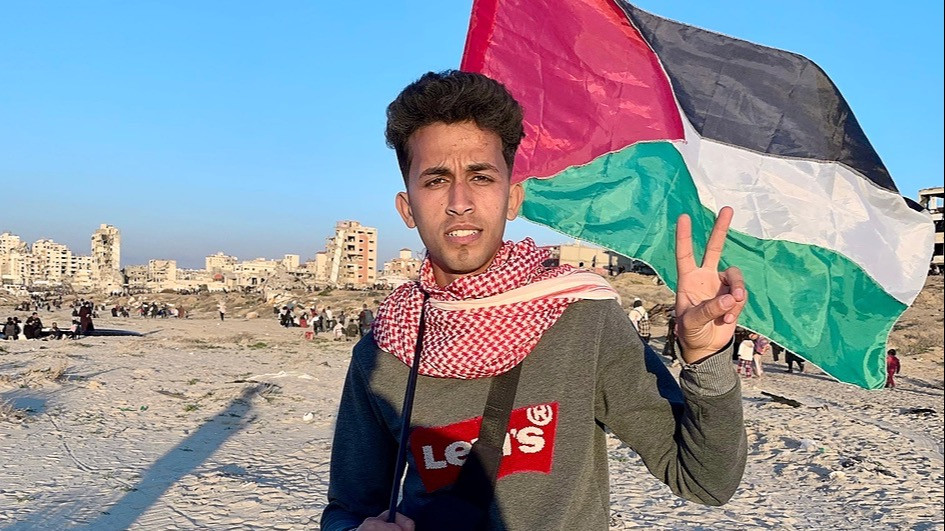
Mohammed Shobair
Fundraiser: chuffed.org/project/mohshbairgaza
I am Mohammed Shbeir, a young man from Gaza, 22 years old. My life was simple and beautiful. I completed a professional diploma in modern automotive electrical engineering, then started learning confectionery-making with my friend and neighbour, Abdullah.
I'd wake up in the morning and we'd buy foul (fava beans) and falafel from Abu Waseem's popular food restaurant next to us. Then I'd go to work at the factory from 9am to 6pm, preparing trays of Namoura (semolina cake) with local ghee, baking and selling them.
In the evening, I'd go with my friends to a café to drink coffee at Abu Qassem cafeteria – famous in the city centre – or at Ranoush cafeteria. Some days we'd go to restaurants for Palestinian Gazan shawarma. Sometimes we'd go for falafel sandwiches from Al-Sousi restaurant in the city center in Al-Rimal. Every Thursday, my friend Fadi and I would go to our friend Mahmoud's place to hang out on his rooftop, smoke shisha, grill, and prepare spicy Gazan salad.
The morning of Saturday, October 7th. My family and I woke up to the sounds of rockets, not knowing what was happening. It was the shock and beginning of suffering – the cursed war. We spent the first weeks of the war under fire-belt bombardment. We were forced to leave our home in the east of the city and went west to my sister's. Then we moved to south-central Gaza Strip to my aunt's.
We spent difficult days there – with water scarcity, no electricity or food. We'd walk long distances to get a water gallon. They were hard days. During this time, I received news of my friend and neighbour Abdullah's martyrdom: the sweets factory was bombed, my college was destroyed, my friend Mahmoud's house was destroyed, and many other beautiful places.
Artillery shelling intensified in the central Gaza area. We were forced to leave and displace south to Rafah city where my grandfather's house was. We spent difficult months there – then the situation worsened and shelling intensified in Rafah. They dropped leaflets warning us that we must leave the city, to displace once again to central Gaza.
We spent difficult days searching for water and food, until news came of our return to northern Gaza, where our beloved home was, after 15 months absence. The joy was overwhelming. We returned home on 9/2/2025, arranged it, removed rubble, and repaired what was destroyed. We lived there until famine came.
We'd walk long distances to get flour to make bread. We spent days without eating a single loaf, and if we got flour, one kilogram cost $80. We lived in anxiety and fear, not wanting to leave our home and beautiful city despite its destruction again, until the occupation began to plant explosive robots in our area and shoot at us from quad-copters. We were forced to leave home and flee to central Gaza, where displacement and transfer cost us the huge amount of $4,000.
It was then we received news of our home and neighbourhood being destroyed in northern Gaza. We made a tent from fabric, curtains, and blankets to sleep inside. It doesn't protect us from cold or heat. We dug a hole in the ground to make a bathroom. We now live on remote land, traveling long distances to get water, suffering from shortages of everything – there's no electricity, no water, no internet, no signal. We suffer from many insects in the ground.
I spend my morning searching for an electricity source. Solar energy? If the sun is available, we charge phones; if the sun is absent, we don't charge phones. Charging one phone costs $1.
I won't hide from you that I crave eating delicious, clean food. A piece of chicken, an egg, vegetables, or even a piece of fruit. I lost a lot of weight. I was 81 KG, now I'm 40 KG. Winter is at the door. We hope the war has truly ended now and that security and peace prevail.
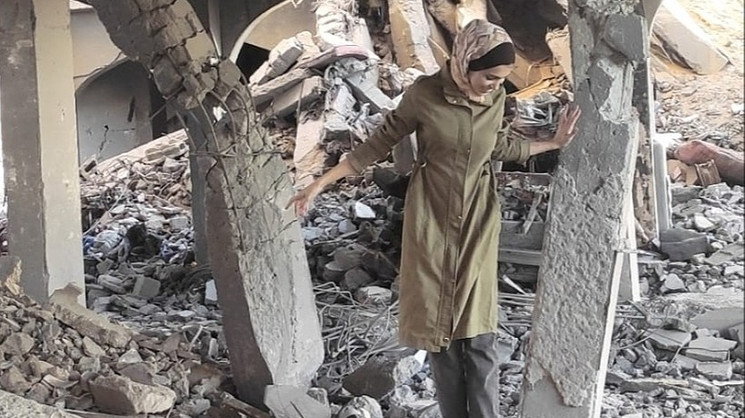
Farah aka “Joy"
Fundraiser: chuffed.org/project/evacuate-joy
I am 23 years old, a literature student, and a Palestinian writer and poet.
I don’t recall my life before October 7th ever being this difficult, or filled with so much pain.
My day used to begin with an overwhelming sense of gratitude, starting at five in the morning as I brewed my dark, black coffee. I’d neatly arrange my books in my bag, check the weather forecast on my laptop, and chat with my mother, who had just woken up to prepare breakfast for herself, me, and my siblings heading to school.
Gradually, the house would empty. My siblings off to school, my brother to university, my mother to the hospital for work, and finally, me. I was always the slow one, taking my time as if this world had no end. I was slow, as if I would never witness the horrors of a doomsday.
October 7th was supposed to be a momentous day, a cherished memory with friends. We were planning to go out for seafood at one of Gaza City's renowned waterfront restaurants, known as Bab Al Bahr.
I woke up at five in the morning, as usual. Coffee, then books, then my laptop, and then – the rapid, non-stop news reports, synchronised with the sounds of rockets that threatened my quiet, forcing my eyes to well up with tears. I remember vividly how I ran like a small child, pleading for a hug from my mother, hoping she would reassure me that this would all end in a minute, two minutes, a week, a month, a year, but certainly not two years.
Everything now feels faster. The days rush by. We start them by building a fire to prepare anything edible, and they end with aching joints and headaches from the sheer amount we’ve endured throughout the day.
There are no quiet mornings anymore – just the drone of reconnaissance aircraft. No coffee, no office, no university, no friends. We have all been scattered. Some have been martyred, some have emigrated, and some – we still don't know their fate.
It is hard for my pen now to keep up with me and write everything we are living through. Should it write about the days my siblings have to fill water gallons and walk long distances? Or the days when we can’t find anything to eat? Or the tens of days we were displaced into the unknown? Or the day our home was destroyed? Or the days we miraculously survived the shelling and the bombs?
Should it write about the days we can't find any internet access to take our university exams? The illnesses we have suffered, and continue to suffer, due to malnutrition and the complete absence of any semblance of hygiene? The bodies lying in the streets and under the rubble of homes, which have turned into skeletons?
Everything now is deeper than it seems. My life is no longer filled with the simplicity and love I was accustomed to. All my dreams now revolve around clean drinking water, healthy food, and a shelter that can take me away from the nightmare of the tent. All my ambitions have been postponed until the day I emerge from the war safe, healed, and still clinging to hope and life.
I try hard not to let love and peace die inside me, and not to view the world through the lens of war and rockets. I hold onto the certainty that there is another corner on the shore of this world filled with peace, and I will see myself step across its threshold and live on its land.
It is difficult for my pen to explain or to write, but I believe now that you understand what it is trying to convey.
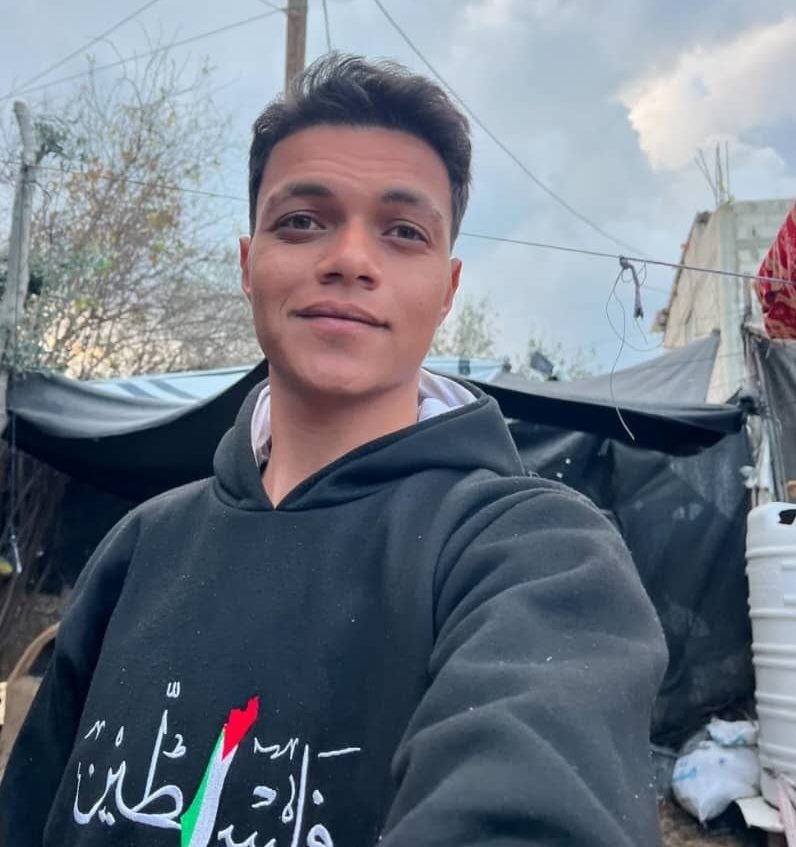
Mohammed Jihad Al-Qadra
Fundraiser: gofundme.com/f/help-young-journalist-mohammed-from-gaza-share-now
I'm the journalist Mohammed Jihad Al Qedra from Khan Younis city, in the south of the Gaza Strip.
Before this genocide began, I was a university student studying Public Relations and Media. My life was ordinary and simple – I'd go to my university in the morning, meet my classmates and friends, and live the details of a normal day like any young person dreaming of their future. The 7th of October 2023 was a date I'd long been waiting for, as it was meant to be my graduation day. A day to celebrate years of hard work and hope. But instead of wearing my graduation gown, I woke up to a war of extermination that hasn't ended to this day.
We're approaching two years now, and we haven't known a single day that resembles our previous life. Everything has changed. There's no longer any normal human life: no water, no adequate food, no electricity, and not even the most basic necessities for survival. We're living in inhuman conditions, besieged by hunger and fear and the loss of loved ones, whilst the world merely watches.
My morning today begins with the sound of aircraft or the roar of bombardment, not with a small alarm reminding me to go to my lectures. I think first: are we still alive? Then begins the search for water or some bread if any can be found. Simple details that were ordinary before the war have today become a daily battle for survival.
And despite all this, I've chosen to continue the path I began by studying media. Since the beginning of this war, I've been practising what I learned: reporting the crimes being committed against us in Gaza. I won't stop fulfilling my mission as long as I'm alive – I write and film and document, to tell the world that we are here, and that our souls are not just numbers.
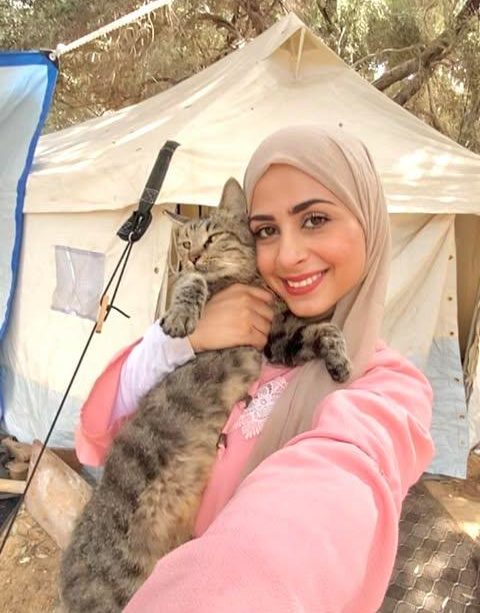
Aseel Al Turk
Fundraiser: gofund.me/2dea0899
Good morning… or should I say, good morning to hope?
And… is there even any hope left?
My life used to be completely different. I’d wake up to get ready for university, tidy my own room in the quiet of the house I loved. I’d meet my friends, we’d plan to go out or hang out late. I had time to dream, to learn, and to plan my future.
My family was always by my side, and so was Liza, my cat, who was like my daughter. She was always with me – following me around the house, sitting next to me while I studied, bringing warmth and life to every morning.
It wasn’t the perfect life, but it was safe, full of love, and I was happy and content. I had a home, and all the people I loved were with me. My family was the most important thing in my life, my real support. Every morning was full of simple routines: breakfast together, laughing at small things, exchanging everyday words that felt so ordinary at the time, but now feel like a treasure of memories.
But now… everything has changed. I wake up to the sound of planes and explosions, in a tiny tent that has become my whole world. My dad got hurt – his right hand and his head –and he can’t use his hand properly anymore. His strength is an inspiration to us, and just having him around eases the fear and exhaustion for me and my siblings.
I’ve been deprived of the creature I love most, my little one and my “daughter,” my cat Liza. Mornings without her are so hard; I feel empty and lost. Memories chase me – her little games with me, her warmth, the way she filled the house – but life without Liza is completely different. There’s a void no one can fill.
The tent we live in now is cramped. Every day brings struggle—struggling for food, struggling to live. There is instability, fear. Not being able to continue my university studies is so frustrating, and losing most of my friends makes the loneliness even worse. Being displaced from our homes, seeing them turned into rubble, moving from one place to another: and so goodbyes, pain, loss… all of these emotions have become our routine now.
Despite all the hardships, my family is still the most important thing. Their voices, their presence, their support keep me holding onto life. I cling to their smiles and little stories amid the chaos, trying not to forget what our lives were like before all this. Every morning now is a fight to survive, a reminder that life still exists despite all the pain. For me, mornings are now moments of resilience, times to gather my strength, and remember that at least we’re still together as a family.
Even amid displacement, loss, and the cold tent, there’s a glimpse of hope.
Every morning, I try to create a moment of positive life amidst the destruction: to laugh a little, to feel warmth even if just for a short moment. Because life, despite everything we’ve lost, is still worth living, and our hope and family are what keep us going.
So… yes. I say good morning to hope.
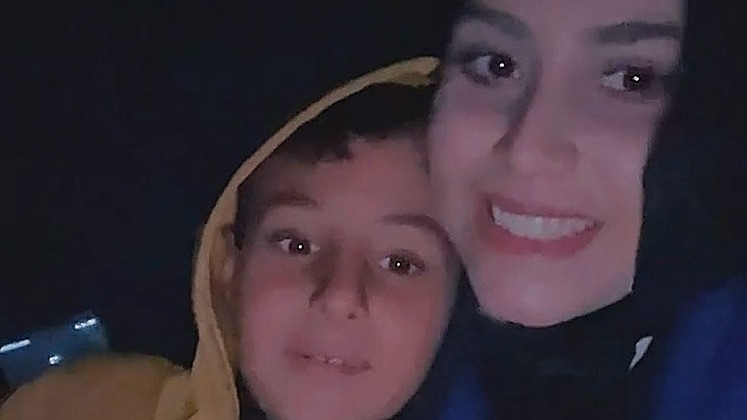
Eslam Mohammed
Fundraiser: chuffed.org/project/128261-photographer-from-gaza-rebuilding-life-dreams
Before the war, my mornings had a rhythm I loved. I would wake up to the calm sound of my family moving around the house, the smell of breakfast filling the air. I’d greet my mother with a cheerful “good morning,” then get dressed and head to my job.
I worked in a sweets and coffee shop, where I was responsible for photographing the products and also serving as a barista. Taking photos of desserts, preparing coffee for customers, and smelling that rich aroma was the highlight of my day. I loved my work deeply – it gave me a sense of pride and joy. After work, I would return home, take a moment with my sketchbook, and draw something small in pencil. My life, though modest, felt whole.
Now, my mornings begin with anxiety. I wake up not to peace, but to the fear of loss. Every day, I worry whether my family is still alive, especially my injured sister. I hardly sleep, tormented by severe itching across my body that I scratch until I bleed. The stress and fear have invaded even my skin. I wake up drained, without hope, without breath.
I miss the camera in my hand, capturing beautiful shots of cakes and coffee. I miss preparing drinks for customers, watching them smile. I miss drawing, too, but I no longer have the energy or peace of mind. Anxiety consumes me.
A few weeks ago, while scrolling the news, I received a call that shattered me: the house next to ours was destroyed, and though my family survived, my aunt Eman and her pregnant daughter Ibtisam were killed under the rubble. My mother was rushed to the hospital from the shock – her blood pressure had spiked dangerously. Earlier in the war, I had already lost my uncle and cousin. I remember my mother’s screams when she learned her brother was gone. The grief never ends; it only adds layers.
One of the hardest parts is knowing I am far from my family. I left not because I wanted to, but because I had to – so that I could one day support them. Yet the distance weighs on me like a punishment. I regret being away when they need me most, even though I had no choice.
My mornings now are not mornings at all – they are about survival. I wake up not knowing what I can endure next. What more must I carry? The fear, the hunger, the thirst, the displacement, the endless loss. I used to start my day with art, with color and aroma. Now I start my day with silence, grief, and fear of what news may come.
• These pieces were curated by Aral Balkan, co-founder of Gaza Verified along with Joy, one of the contributors.
RELATED

- Opinion
- 27 Feb 26
IRMA warns of AI threat to €1 billion Irish music industry

- Opinion
- 26 Feb 26
Bill Gates apologises to staff over Epstein files
RELATED

- Lifestyle & Sports
- 25 Feb 26
FAI confirm Ireland Nations League will compete against Israel at Aviva despite backlash

- Opinion
- 23 Feb 26






